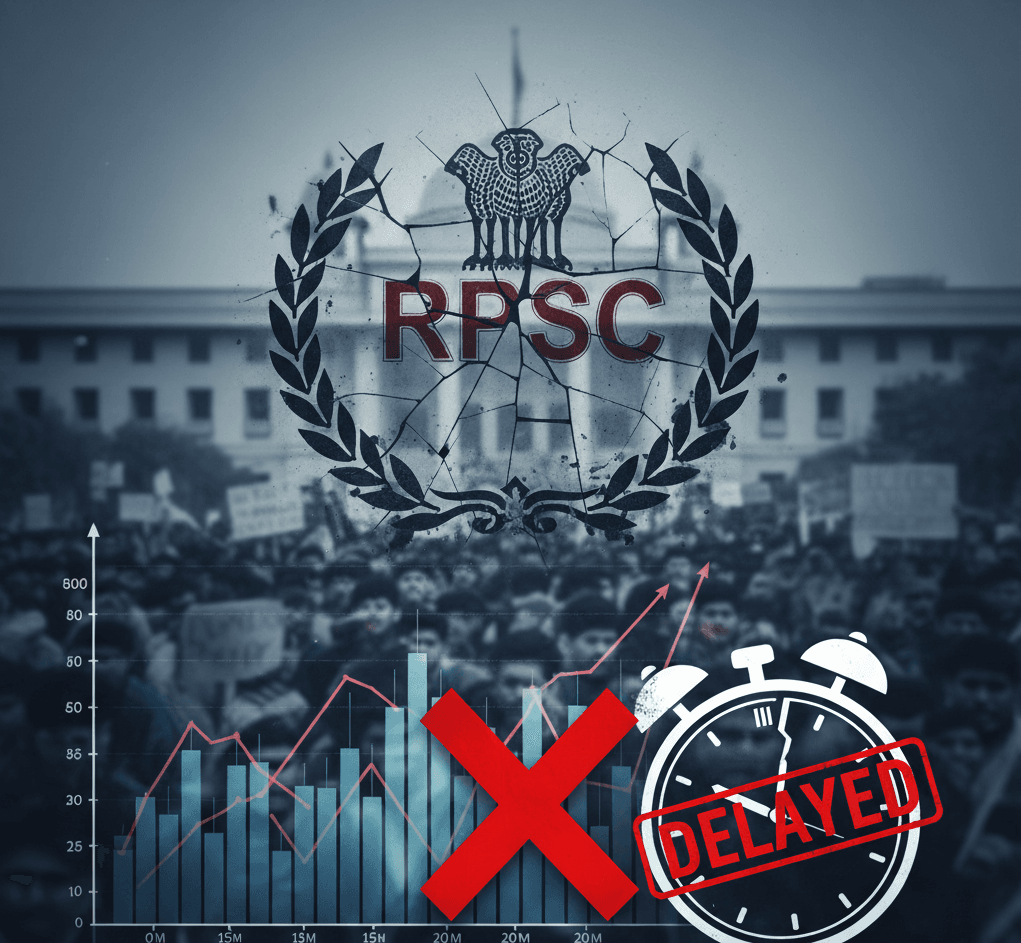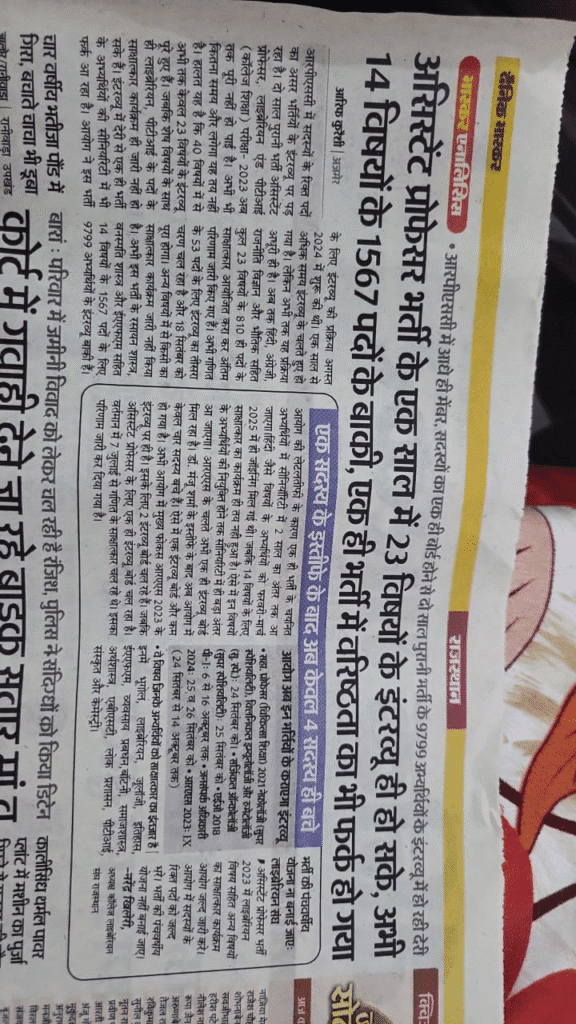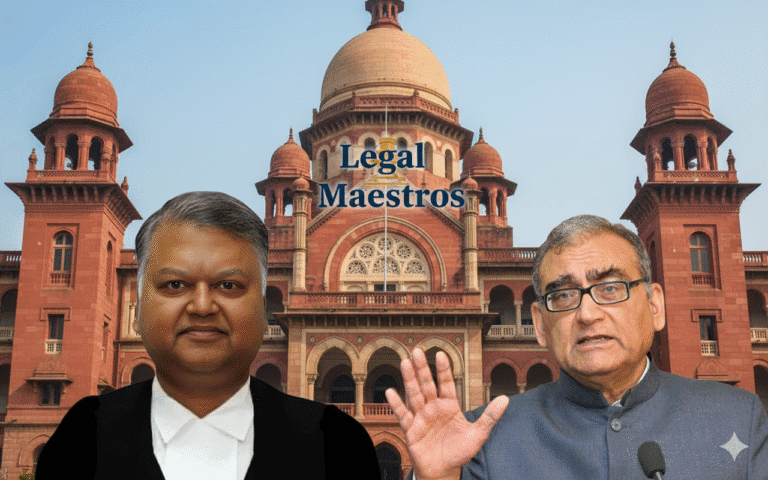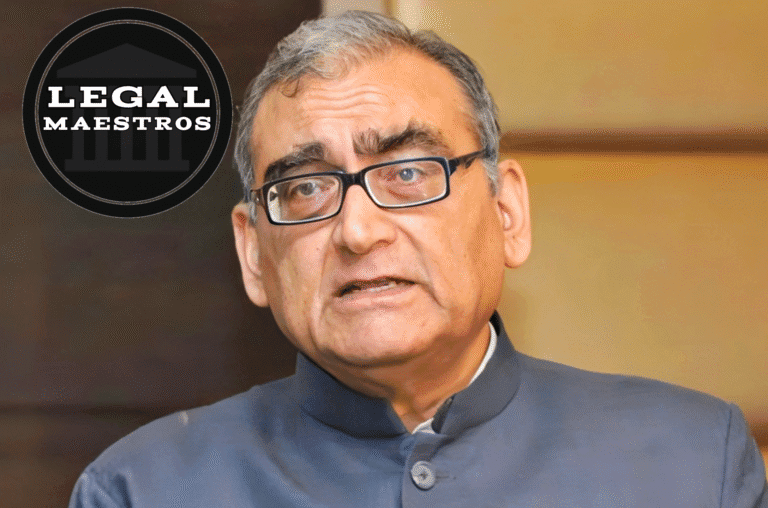
RPSC Gemini
The Rajasthan Public Service Commission (RPSC), the leading recruiting body of the state, is caught in the eye of a storm, with some serious claims of inconsistency and arbitrariness, and lack of transparency in an adverse manner.
The aspirations of thousands of educational seekers are mired in procedural irregularities especially in the Assistant Professor (College Education) application drive which is being advertised on June 22, 2023, on 1913 vacancies in 48 disciplines.
A review of the actions of the commission depicts a trend of discretionary actions of the commission that not only compromises the values of fair competition, but also causes great mental and professional sufferings to candidates. Based on the information obtained during the recruitment process, this elaborate critique reveals the systematic malfunction that is undermining the confidence in one of the foundations of the administrative machinery in the state.
For any queries or to publish an article or post or advertisement on our platform, do call at +91 6377460764 or email us at contact@legalmaestros.com.
The Arbitrary Gauntlet: Interview Call Ratio Discrepancy
The most obvious discrepancy between the approach of the RPSC is the absurdly low and high discrepancy in the ratio of called upon candidates to have interviews on various subjects. One common, well known rule with regard to competitive examinations is that one should call to the interview just about three times as many applicants as there are vacancies to the posting.
The practice not only guarantees a competitive pool, but it is also within manageable limits. Nonetheless, the statistics of the Assistant Professor hiring process indicate that the RPSC has not followed this norm without any apparent logic or coherence.
This difference can be best demonstrated by the use of a comparative analysis. The RPSC has also kept a fairly stable, though slightly less, ratio in its own flagship Rajasthan Administrative Service (RAS) examinations. When recruiting 988 posts under RAS 2021, 2174 applicants were invited to the interview, which was 2.20 applicants per post. Equally, in the RAS 2023 test, 2168 candidates were invited to fill 905 vacancies, which equates to 2.39. These values give a reference standard to which the Assistant Professor recruitment ratios are excessively insane.
For any queries or to publish an article or post or advertisement on our platform, do call at +91 6377460764 or email us at contact@legalmaestros.com.
The inconsistencies become even more apparent when these figures are contrasted with other subjects within the same recruitment drive:
• Political Science: For 181 posts, 1501 candidates were called, an excessively high ratio of 8.29 per seat.
• Hindi: For 214 posts, 1612 candidates were called, resulting in a ratio of 7.53 per seat.
• Urdu: For 24 posts, 123 candidates were interviewed, a ratio of 5.12 per seat.
In stark contrast, several other subjects saw ratios much closer to the expected norm:
• Philosophy: For 11 posts, 35 candidates were called, a ratio of 3.18 per seat.
• Psychology: For 10 posts, 33 candidates were interviewed, a ratio of 3.3 per seat.
• Music (Instrument): For 4 posts, 12 candidates were called, a ratio of exactly 3 per seat.
• Sindhi: For 3 posts, 6 candidates were called, a ratio of 2 per seat.
This data demonstrates a complete absence of a uniform policy. The commission appears to be operating on a subject-by-subject basis with “मनमर्जी के अनुसार” (according to its own whims), as the source document suggests.
This type of discretionary authority without an explicit justifiable framework is a nest place of suspicion and destroys the credibility of the whole selection process. It puts unequal playing fields, whereby a candidate has his or her chances to be based not only on his or her merits but also on the arbitrary ratio assigned to his or her subject.
The Illusion of Opportunity:Unrealistic Cut-off Margins
The issue is exacerbated when it is seen that there is a huge gap between the cut-off points of being called to the interview and the ultimate cut-off with respect to selection. There is a strong cause of alarm in how the RPSC has been making such a high number of calls to people who in pure mathematical terms have naughty chance of being given one of the final places, no matter how good they are in the interview.
For any queries or to publish an article or post or advertisement on our platform, do call at +91 6377460764 or email us at contact@legalmaestros.com.
The Assistant Professor position interview is rated at 24 marks. A rational and reasonable approach would give the candidates who have been summoned to this final stage a real chance to close in and make it to the final list. But in most of the subjects, the difference between interview call cut-off and final merit list cut-off is significantly larger than the maximum possible interview score.
This is most outrageous once more with Mathematics. The interview call cut-off was 56.42 marks, although the cut-off of final selection had high 152.17. This provides an astounding mark up of 95.58. Should a candidate with precisely 56.42 in the written examination receive the entire 24 marks in the interview, he would have only 80.42 in total, by no means close to the ultimate cut-off mark of 152.17.
Inviting such candidates to an interview is not merely a formality which is disliked by the procedure; it is rather a cruel and misleading measure which brings false hope to such candidates and wastes their precious time and resources.
For any queries or to publish an article or post or advertisement on our platform, do call at +91 6377460764 or email us at contact@legalmaestros.com.
This pattern repeats across numerous disciplines:
• In Physics, the interview cut-off was 66.35, while the final cut-off was 131.72, a margin of 65.37 marks.
• In Law, the interview cut-off was 96.63, and the final cut-off was 158.35, a margin of 61.72 marks.
• In Political Science, the interview cut-off was 81.43, with the final cut-off at 133.20, leaving a gap of 51.77 marks.
• In Hindi, the margin was 44.33 marks (117.79 interview cut-off vs. 162.12 final).
• In Urdu, the margin was 42.02 marks (126.32 interview cut-off vs. 168.34 final).
• Even in subjects with smaller margins, the gap often exceeded the 24 marks available in the interview. For instance, in Philosophy, the margin was 36.05 marks , and in Psychology, it was 33.55 marks.
Such imperfect methodology is of no use except to increase the number of interviewees, which will inevitably contribute to considerable delays in the recruitment process. It poses a very basic question, how do we interview people who cannot be chosen mathematically? This is unfair and is an indication of bad planning and the lack of concern with the welfare of the candidates.
Procedural Delays and the Cost to Man.
The immediate effect of these exaggerated interview schedules and inconsistency of these procedures is a disorganized and excruciatingly long hiring process.
For any queries or to publish an article or post or advertisement on our platform, do call at +91 6377460764 or email us at contact@legalmaestros.com.
It is not only statistical in nature but also there is a deep human cost to this administrative inefficiency. Although results of some of the subjects have been announced and candidates posted, many aspirants in other subjects are in a state of suspense even awaiting the presentation of their interview dates.
At the time of the analysis, 9,799 students in 14 subjects who are competing to get 1,567 posts, await interviews. Such staggered process poses seniority crisis.
Those candidates who come out successfully in subjects whose results were announced earlier will be recruited and will receive a seniority, whereas other equally deserving candidates who fail to come out in other subjects are left behind, through no fault of their own. This is both a direct and negative effect on their career development and economic independence.
For any queries or to publish an article or post or advertisement on our platform, do call at +91 6377460764 or email us at contact@legalmaestros.com.
Moreover, as a new recruitment drive of an Assistant Professor is expected in December 2025, the lethargy of the RPSC is quite an alarming pattern. This will compel many candidates who have proved to have high chances of succeeding within the current and delayed recruitment to prepare and go through another cycle of examination torture merely because the RPSC did not finish the earlier cycle in a good time. It is an obvious administrative negligence and is comparable to gambling with the futures and psychological health of students that have spent years of training.
A Veil of Secrecy: The Transparency Shortage.
Being behind all these problems is an overall culture of secrecy in the RPSC. An important principle of equitable recruitment process is the concept of transparency that involves disclosure of marks in time. The RPSC however has a habit of not publishing the marks of those who are selected in the mainstream market, at times even after the final outcome has been announced which is more than a year.
This absence of transparency results in suspicion and it is impossible to effectively question the results by the candidates and the people. It does not allow any serious examination of the patterns of the interview scoring and hides the possible bias or anomalies. This has been done directly contrary to the ethics of good governance and accountability which has worsened the reputation of the already stained commission.
For any queries or to publish an article or post or advertisement on our platform, do call at +91 6377460764 or email us at contact@legalmaestros.com.
Pattern of Problems: Postgraduate Student Exam: Beyond the Assistant Professor Exam
The anomalies in the 2023 Assistant Professor hiring are not a single occurrence, but rather reflective of greater institutional corruption within the commission. The RPSC has repeatedly found itself in controversies involving paper leaks, corruption and mismanagement in recent years which has culminated in judicial action and outrage by the people.
As an example, in 2021 the Rajasthan High Court cancelled the 2021 Sub-Inspector (SI) recruitment examination because of an enormous paper leak scandal and the observations indicated systemic corruption by the commission appointed by it.
These cases are indicative of a disastrous pattern of institutional non-performance that is beyond the scope of a single analysis. The fact that anti-corruption bodies are still investigating several examinations that were administered by RPSC only cement the belief that the body is not fulfilling its main role of ensuring that exams conducted are free and fair. This bigger picture of ongoing scandals causes the discrepancies in the recruitment of the Assistant Professor not to be simply issues of poor administration, but a segment of a greater crisis of integrity.
For any queries or to publish an article or post or advertisement on our platform, do call at +91 6377460764 or email us at contact@legalmaestros.com.
Recommendation: A Call to Urgent and Systemic Reform
All the evidence points towards the fact that Rajasthan Public Service Commission is not doing its job well of ensuring fair, transparent and timely recruitments. The random interview proportions, the mathematically impossible cut-off rates, the debilitating time delays and the absence of transparency in the Assistant Professor hiring process are not small administrative missteps; they are severe injustices being committed to thousands of applicants.
The RPSC is not only wasting the resources of the people but also causing the youth profound mental and emotional suffering by calling such a large number of people who have no chance to be hired. The existing situation does not require only partial solutions. It demands a wholesale revision of the process of checking and screening of the RPSC.
An established standardized and legally correct policy needs to be made on how many candidates should be called to an interview. It should be transparent and all marks and selection criteria disclosed in time. Above all, the delays and irregularities which have turned into the standard of the work of the commission should be held responsible. It will determine the future of thousands of students and the reputation of recruitment of the public service in Rajasthan.
For any queries or to publish an article or post or advertisement on our platform, do call at +91 6377460764 or email us at contact@legalmaestros.com.

RPSC – Date of Advertisement – 22.06.2023 Asst. Professor College Education
Total 48 subjects post 1913
संयुक्त विज्ञापन संख्या – 01/परीक्षा/ सहायक आचार्य/ कॉलेज शिक्षा/ EP-I/2023-24
For any queries or to publish an article or post or advertisement on our platform, do call at +91 6377460764 or email us at contact@legalmaestros.com.
| Name of Subject | Seats | Date of Exam | Candidates called for interview | times | Date of Result for interview call | Date of Final Result | Margin Between interview and final cut off |
| Botany | 70 | 20/05/2024 | 398 | 5.68 | 04/03/2025 | No interview | |
| Chemistry | 81 | 22/05/2024 | 415 | 5.12 | 27/01/2025 | No interview | |
| Maths | 53 | 23/05/2024 | 653 | 12.32 | 24/03/2025 | 17/09/2025 | 95.58 |
| Physics | 60 | 19/05/2024 | 604 | 10.06 | 23/01/2025 | 07/07/2025 | 65.37 |
| Zoology | 64 | 21/05/2024 | 367 | 5.64 | 25/03/2025 | No interview | |
| A.B.S.T | 86 | 20/05/2025 | 515 | 5.98 | 10/02/2025 | No interview | |
| Business Administration | 71 | 28/05/2024 | 329 | 4.63 | 06/03/2025 | No interview | |
| E.A.F.M | 70 | 23/05/2024 | 561 | 8.01 | 10/03/2025 | No interview | |
| Geology | 06 | 31/03/2024 | 18 | 3 | 11/07/2024 | 11/09/2024 | 20 |
| Law | 25 | 31/03/2024 | 103 | 4.12 | 22/07/2024 | 30/09/2024 | 61.72 |
| Economics | 103 | 29/05/2024 | 524 | 5.08 | 14/02/2025 | No interview | |
| English | 153 | 21/05/2024 | 581 | 3.79 | 18/11/2024 | 20/01/2025 | 40.47 |
| Geography | 150 | 18/05/2024 | 1217 | 8.11 | 27/03/2025 | No interview | |
| Hindi | 214 | 17/03/2024 | 1612 | 7.53 | 08/08/2024 | 16/12/2024 | 44.33 |
| History | 177 | 17/05/2024 | 1911 | 10.79 | 19/03/2025 | No interview | |
| Sociology | 80 | 30/05/2024 | 296 | 3.7 | 19/02/2025 | No interview | |
| Philosophy | 11 | 02/06/2024 | 35 | 3.18 | 18/12/2024 | 30/05/2025 | 36.05 |
| Political Science | 181 | 16/05/2024 | 1501 | 8.29 | 09/12/2024 | 02/05/2025 | 51.77 |
| Public Administration | 45 | 19/05/2024 | 180 | 4 | 06/02/2025 | No interview | |
| Sanskrit | 76 | 19/05/2024 | 309 | 4.06 | 28/01/2025 | No interview | |
| Urdu | 24 | 22/05/2024 | 123 | 5.12 | 25/11/2024 | 12/02/2025 | 42.02 |
| Punjabi | 01 | 31/03/2024 | 03 | 3 | 11/07/2024 | 30/08/2024 | |
| Library Science | 01 | 31/03/2024 | 03 | 3 | 12/07/2024 | 04/03/2025 | |
| Psychology | 10 | 01/06/2024 | 33 | 3.3 | 01/10/2024 | 21/02/2025 | 33.35 |
| Rajasthani | 06 | 22/05/2024 | 31 | 5.16 | 18/12/2024 | No interview | |
| Sindhi | 03 | 31/03/2024 | 06 | 2 | 03/07/2024 | 28/08/2024 | 21.03 |
| Jainology | 01 | 31/03/2024 | 03 | 3 | 24/07/2024 | No interview | |
| Garment Production & Export Management | 01 | 31/03/2024 | 03 | 3 | 29/07/2024 | No interview | |
| Military Science | 01 | 31/03/2024 | 03 | 3 | 27/06/2024 | 01/10/2024 | 17 |
| Art History | 02 | 01/06/2024 | 06 | 3 | 23/08/2024 | 21/02/2025 | 23.83 |
| Museology | 02 | 31/03/2024 | 06 | 3 | 24/07/2024 | 29/08/2024 | 32.23 |
| Drawing & Painting | 35 | 20/05/2025 | 175 | 5 | 27/11/2024 | 20/05/2025 | 48.5 |
| Music (Vocal) | 12 | 22/05/2024 | 54 | 4.5 | 12/08/2024 | No interview | |
| Music (Instrument) | 04 | 31/03/2024 | 12 | 3 | 03/07/2024 | 29/08/2024 | 46.81 |
| Applied Art | 05 | 23/05/2024 | 19 | 3.8 | 13/08/2024 | 20/09/2024 | 49.46 |
| Paintings | 05 | 31/03/2024 | 27 | 5.4 | 17/10/2024 | 31/01/2025 | 31.96 |
| Sculpture | 04 | 17/03/2024 | 12 | 3 | 17/10/2024 | 07.05.2025 | 32.13 |
| Music Tabla | 02 | 31/03/2024 | 09 | 4.5 | 03/07/2024 | 30/08/2024 | 30.46 |
| Music (Violin) | 02 | 31/03/2024 | 06 | 3 | 27/06/2024 | 30/08/2024 | 33.47 |
| Agriculture (Entomology) | 01 | ||||||
| Agriculture (Animal Husbandary & Dairy Science) | 02 | ||||||
| Agriculture (Agronomy) | 03 | ||||||
| Agriculture (Economics) | 01 | ||||||
| Agriculture (Engineering) | 01 | ||||||
| Agriculture (Horticulture) | 03 | ||||||
| Agriculture (Live Stock) | 01 | ||||||
| Agriculture (Plant Pathology) | 02 | ||||||
| Agriculture (Soil Science) | 02 |
RAS 2021 Adv date 20/07/2021
Total post 988 INTERVIEW called – 2174 2.20





![JOB POST: Junior Associate at ASM Law Chambers, Jaipur [Freshers]](https://legalmaestros.com/wp-content/uploads/2025/11/Gemini_Generated_Image_8wrxer8wrxer8wrx-768x708.png)


1 thought on “How RPSC is Failing Rajasthan’s Aspirants : An Investigation into Recruitment Irregularities”